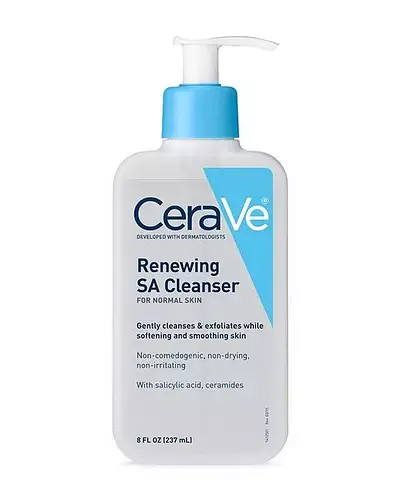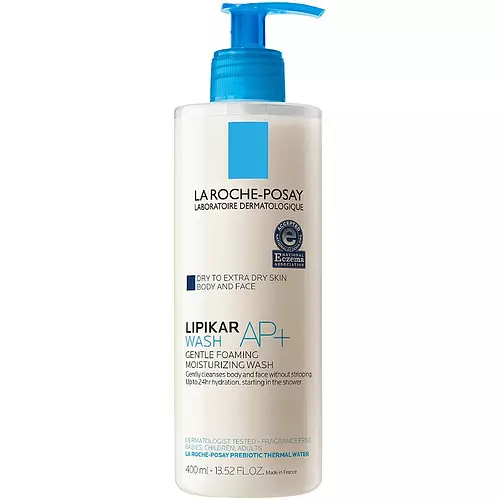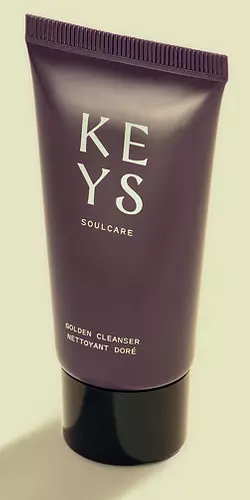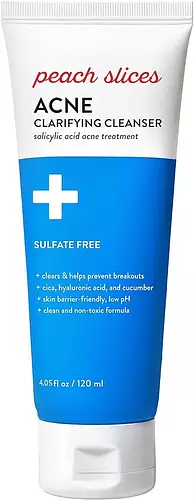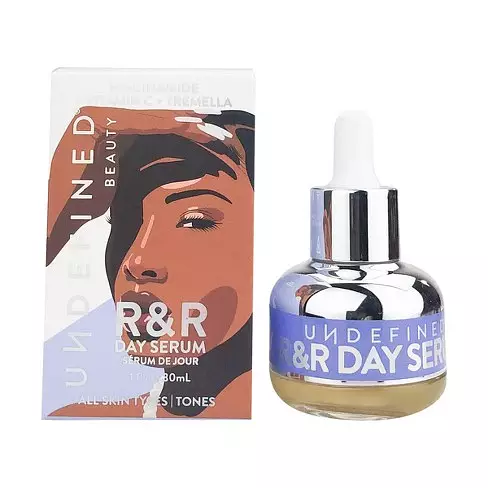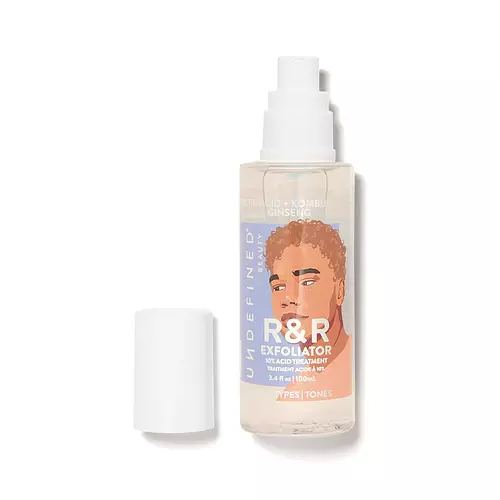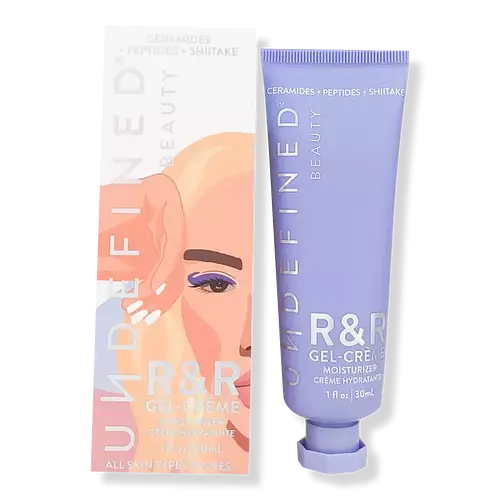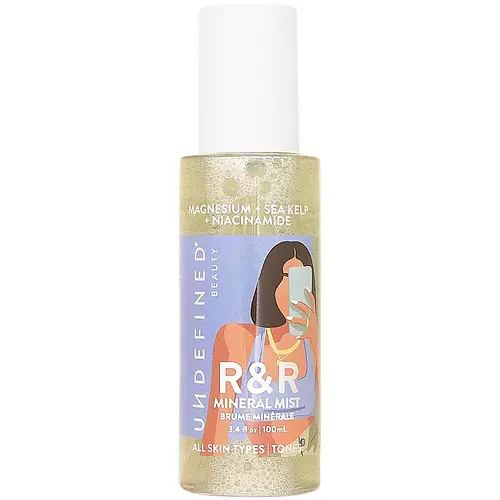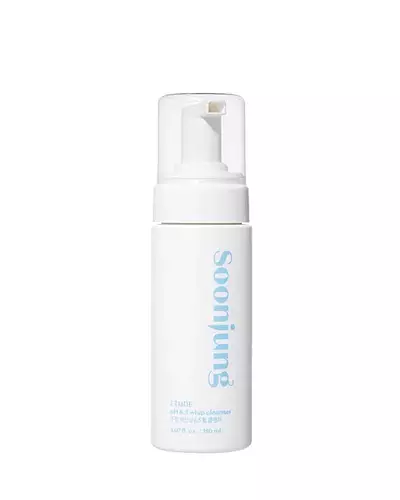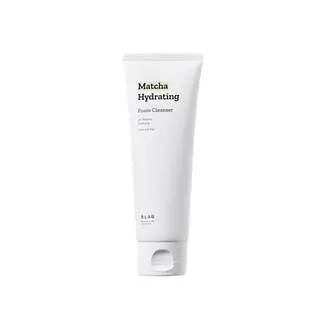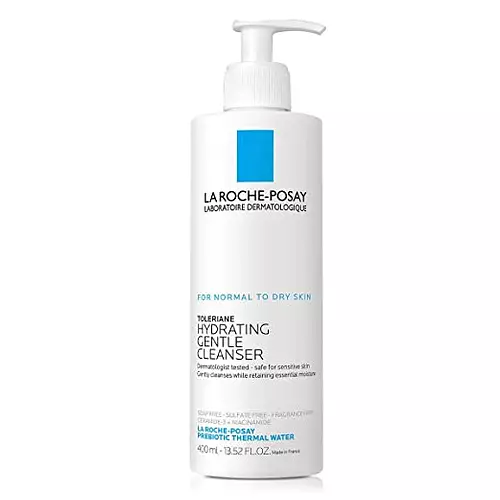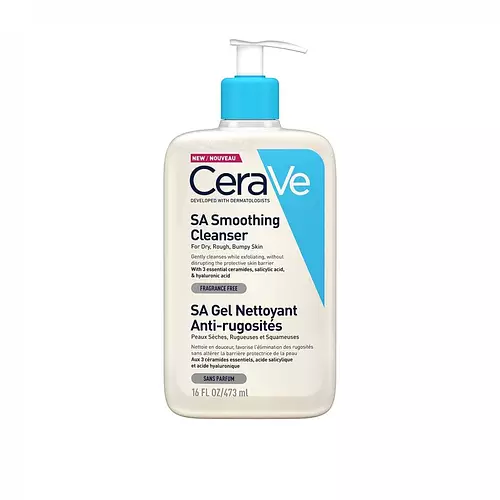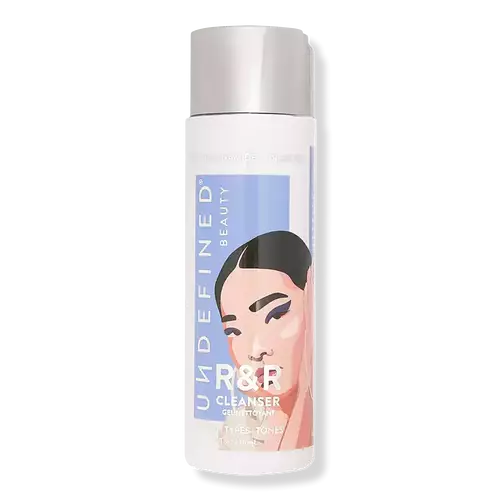
Undefined Beauty R&R Cleanser Ingredients Explained
Published on June 14, 2022 Submitted by Harkirat
Overview
What it is
Face cleanser with 24 ingredients that contains niacinamide
Cool Features
It is vegan, cruelty-free, and reef safe
Suited For
It has ingredients that are good for fighting acne, anti aging, dry skin, brightening skin, sensitive skin, oily skin, reducing pores, scar healing and dark spots
Free From
It doesn't contain any harsh alcohols, common allergens, parabens, silicones or sulfates
Fun facts
Undefined Beauty is from United States. This product is used in 7 routines created by our community.
We independently verify ingredients and our claims are backed by peer-reviewed research. Does this product need an update? Let us know.
Face cleanser with 24 ingredients that contains niacinamide
Quick info
You should know
Notable Ingredients
This product contains 1 ingredient that may have this attribute:
Benefits
This product contains 4 ingredients that may have this attribute:
This product contains 1 ingredient that may have this attribute:
This product contains 6 ingredients that may have this attribute:
This product contains 6 ingredients that may have this attribute:
This product contains 2 ingredients that may have this attribute:
This product contains 1 ingredient that may have this attribute:
This product contains 1 ingredient that may have this attribute:
This product contains 1 ingredient that may have this attribute:
This product contains 2 ingredients that may have this attribute:
This product contains 2 ingredients that may have this attribute:
Ingredients 24
Water. It's the most common cosmetic ingredient of all. You'll usually see it at the top of ingredient lists, meaning that it makes up the largest part of the product.
Aloe Barbadensis Leaf Juice comes from leaves of the aloe plant. Aloe Barbadensis Leaf Juice is best known for helping to soothe sunburns. It is also anti-inflammatory, moisturizing, antiseptic, and can help heal wounds.
Cocamidopropyl Hydroxysultaine is a synthetic cleansing agent, though it is derived from coconut oil.
Sodium Lauroyl Methyl Isethionate is a cleansing ingredient. It is a surfactant, meaning it helps gather dirt, oil, and other pollutants. This helps them be rinsed away easily.
Glycerin is already naturally found in your skin. It helps moisturize and protect your skin.
Betaine is a common humectant (a substance that promotes retention of moisture). It's known to be gentle on the skin and can help balance hydration.
Sodium PCA is the sodium salt of pyroglutamic acid and is naturally occurring on human skin.
Niacinamide has emerged as an all-star ingredient due to its many benefits.
Panthenol (also referred to as pro-vitamin B5) is a common ingredient that helps hydrate and soothe the skin.
Centella Asiatica Extract (Cica) is derived from an herb native to Southeast Asia. It is famous for its anti-inflammatory and soothing properties.
Glycyrrhiza Glabra (Licorice) Stem Extract is the extract of the stems of Glycyrrhiza glabra, Fabaceae.
Camellia Sinensis Leaf Extract is derived from the leaves of the tea plant. Black tea, green tea, and oolong tea are all harvested from this plant.
Allantoin plays a role in soothing and moisturizing the skin. Because of this, it is often added to products with strong active ingredients.
Olea Europaea Fruit Oil is the fixed oil obtained from the ripe fruit of the Olive. In other words - olive oil.
Persea Gratissima Oil is made by pressing dehydrated avocado fruit from the tree Persea gratissima, Lauraceae.
This ingredient is the fixed oil extracted from seeds of the desert shrub Jojoba. It is more commonly known as jojoba oil. The seed oil is liquid wax ester from the plant. It is non-comedogenic.
Lactobacillus Ferment is created by fermenting the Lactobacillus bacteria. It helps keep our skin's natural barrier and microbiome healthy.
Sodium Benzoate is a preservative. It's used in both cosmetic and food products to inhibit the growth of mold and bacteria. It is typically produced synthetically.
Potassium Sorbate is a preservative used to prevent yeast and mold in products. It is commonly found in both cosmetic and food products.
Water, Aloe Barbadensis Leaf Juice, Cocamidopropyl Hydroxysultaine, Sodium Methyl 2-Sulfolaurate, Disodium 2-Sulfolaurate, Sodium Lauroyl Methyl Isethionate, Glycerin, Betaine, Sodium PCA, Niacinamide, Panthenol, Centella Asiatica Extract, Tremella Fuciformis Polysaccharide, Glycyrrhiza Glabra Stem Extract, Lentinus Edodes Extract, Camellia Sinensis Leaf Extract, Allantoin, Olea Europaea Fruit Oil, Persea Gratissima Oil, Simmondsia Chinensis Seed Oil, Chlorophyllin-Copper Complex, Lactobacillus Ferment, Sodium Benzoate, Potassium Sorbate
Ingredient Ratings
Based on the number of likes and dislikes each ingredient has received.
Ingredients Explained
Water. It's the most common cosmetic ingredient of all. You'll usually see it at the top of ingredient lists, meaning that it makes up the largest part of the product.
So why is it so popular? Water most often acts as a solvent - this means that it helps dissolve other ingredients into the formulation.
You'll also recognize water as that liquid we all need to stay alive. Talk about multi-purpose! If you see this, drink a glass of water. Stay hydrated!
Learn more about WaterAloe Barbadensis Leaf Juice comes from leaves of the aloe plant. Aloe Barbadensis Leaf Juice is best known for helping to soothe sunburns. It is also anti-inflammatory, moisturizing, antiseptic, and can help heal wounds.
Aloe is packed with good stuff including Vitamins A, C, and E. These vitamins are antioxidants, which help fight free-radicals and the damage they may cause. Free-radicals are molecules that may damage your skin cells, such as pollution.
Aloe Barbadensis Leaf Juice also contains sugars. These sugars come in the form of monosaccharides and polysaccharides, folic acid, and choline. These sugars are able to help bind moisture to skin.
It also contains minerals such as calcium, 12 anthraquinones, fatty acids, amino acids, and Vitamin B12.
Learn more about Aloe Barbadensis Leaf JuiceCocamidopropyl Hydroxysultaine is a synthetic cleansing agent, though it is derived from coconut oil.
It is used to enhance the texture of products by boosting lather and thickening the texture. As a cleanser, Cocamidopropyl Hydroxysultaine is mild.
We don't have a description for Sodium Methyl 2-Sulfolaurate.
We don't have a description for Disodium 2-Sulfolaurate.
Sodium Lauroyl Methyl Isethionate is a cleansing ingredient. It is a surfactant, meaning it helps gather dirt, oil, and other pollutants. This helps them be rinsed away easily.
Glycerin is already naturally found in your skin. It helps moisturize and protect your skin.
A study from 2016 found glycerin to be more effective as a humectant than AHAs and hyaluronic acid.
As a humectant, it helps the skin stay hydrated by pulling moisture to your skin. The low molecular weight of glycerin allows it to pull moisture into the deeper layers of your skin.
Hydrated skin improves your skin barrier; Your skin barrier helps protect against irritants and bacteria.
Glycerin has also been found to have antimicrobial and antiviral properties. Due to these properties, glycerin is often used in wound and burn treatments.
In cosmetics, glycerin is usually derived from plants such as soybean or palm. However, it can also be sourced from animals, such as tallow or animal fat.
This ingredient is organic, colorless, odorless, and non-toxic.
Glycerin is the name for this ingredient in American English. British English uses Glycerol/Glycerine.
Learn more about GlycerinBetaine is a common humectant (a substance that promotes retention of moisture). It's known to be gentle on the skin and can help balance hydration.
Betaine is best for improving hydration and soothing irritated skin. Studies show betaine may help with uneven skin tones.
Betaine is naturally created in the skin and body. The form found within cosmetic products can be either plant-dervied or synthetic.
Learn more about BetaineSodium PCA is the sodium salt of pyroglutamic acid and is naturally occurring on human skin.
The PCA stands for pyrrolidone carboxylic acid, a natural amino acid derivative.
Sodium PCA is a has conditioning, anti-inflammatory, and humectant properties. Humectants help hydrate your skin by drawing moisture from the air. This helps keep your skin moisturized.
Learn more about Sodium PCANiacinamide has emerged as an all-star ingredient due to its many benefits.
It is known to treat acne by reducing inflammation. It also helps fade dark-spots and strengthen the skin by promoting the growth of the ceramide barrier.
Other benefits include smoothing wrinkles and minimizing redness.
The cherry on top? Niacinamide can also help build keratin, a protein that keeps skin firm.
When incorporating niacinamide into your routine, look out for concentration amounts. Typically, 5% niacinamide provides benefits such as fading dark spots. However, if you have sensitive skin, it is better to begin with a smaller concentration.
Niacinamide can be mixed with other ingredients to boost benefits. For instance, it has shown to be effective when used with copper, folic acid, and zinc to treat acne.
Learn more about NiacinamidePanthenol (also referred to as pro-vitamin B5) is a common ingredient that helps hydrate and soothe the skin.
lt is a humectant, meaning that it helps the skin attract and retain moisture.
Another benefit is the anti-inflammatory abilities. This means that it's great for sensitive, irritation-prone skin.
Once oxidized, panthenol converts to pantothenic acid. Panthothenic acid is found in all living cells.
Learn more about PanthenolCentella Asiatica Extract (Cica) is derived from an herb native to Southeast Asia. It is famous for its anti-inflammatory and soothing properties.
Cica is rich in antioxidants and amino acids, such as Madecassic Acid and Asiaticoside.
Studies show the compounds in cica help with:
The combination of all these properties makes cica effective at soothing, hydrating, and protecting the skin.
Other great components of Cica include Vitamin A, vitamin C, several B vitamins, and Asiatic Acid.
Fun fact: Cica has been used as a medicine and in food for many centuries. As a medicine, it is used to treat burns, scratches, and wounds.
Learn more about Centella Asiatica ExtractTremella Fuciformis Polysaccharide are the sugars from the snow mushroom.
Snow mushroom is rich in polysaccharides, giving it moisturizing benefits. As a humectant, snow mushroom helps draw moisture from the air to the skin. Polysaccharides are able to mimic our skin's natural carbohydrates to help the skin retain water.
Glycyrrhiza Glabra (Licorice) Stem Extract is the extract of the stems of Glycyrrhiza glabra, Fabaceae.
Extracts of licorice have demonstrated to have antibacterial, anti‐inflammatory, antiviral, antioxidant properties.
We don't have a description for Lentinus Edodes Extract.
Camellia Sinensis Leaf Extract is derived from the leaves of the tea plant. Black tea, green tea, and oolong tea are all harvested from this plant.
This ingredient has many skin benefits:
This ingredient contains polyphenols, a strong antioxidant. Antioxidants help fight off molecules that damage skin cells.
On top of that, the antioxidants in green tea neutralize free-radicals from the sun. This gives the skin some extra UV protection, but should not replace sunscreen.
Many components of tea have anti-inflammatory properties.
Polyphenols and L-theanine help soothe the skin and reduce irritation. The caffeine in Camellia Sinensis Leaf Extract helps calm inflamed blood vessels.
Other compounds found in tea include: Vitamin Bs, linoleic acid, magnesium, calcium, iron, and zinc.
Research has shown both drinking Camellia Sinensis Leaf Tea and applying it to the skin can help boost skin elasticity and hydration. Studies also show using tea extract may reduce sebum, or oil, production.
Learn more about Camellia Sinensis Leaf ExtractAllantoin plays a role in soothing and moisturizing the skin. Because of this, it is often added to products with strong active ingredients.
Some studies have shown this ingredient can promote wound healing with higher concentrations.
Allantoin is derived from the comfrey plant but produced synthetically for cosmetic products to ensure purity.
Learn more about AllantoinOlea Europaea Fruit Oil is the fixed oil obtained from the ripe fruit of the Olive. In other words - olive oil.
The primary contents of olive oil are glycerides of the fatty acids linoleic, oleic and palmitic.
Olive oil also contains antioxidants such as Vitamin E. Antioxidants may help reduce signs of aging by fighting unstable free-radical molecules. It also contains Vitamins A (retinol), D, and K.
The squalene in olive oil makes it a great emollient. Emollients help soothe and soften your skin by trapping moisture in. This makes olive oil a great skin moisturizer.
Studies show olive oil to have antibacterial and antifungal properties in low concentrations. Another study found olive oil irritated sensitive oily skin. We always recommend speaking with a professional about using this ingredient in your routine.
Learn more about Olea Europaea Fruit OilPersea Gratissima Oil is made by pressing dehydrated avocado fruit from the tree Persea gratissima, Lauraceae.
Avocado Oil has antioxidant properties. Antioxidants help fight off free-radicals. Free-radicals are molecules that may damage your skin cells.
Avocado Oil is mostly made up of the glycerides of fatty acids. About 67% of these fatty acids is made up of oleic acid. Palmitic acid and linoleic acid are also present.
These fatty acids help hydrate and soften the skin. It may increase collagen content in the skin. Collagen helps keep your skin plump and firm.
Avocado Oil reduces inflammation and has not shown to clog glands.
Avocados also have B vitamins, vitamin K, vitamin C, vitamin E, and potassium.
Learn more about Persea Gratissima OilThis ingredient is the fixed oil extracted from seeds of the desert shrub Jojoba. It is more commonly known as jojoba oil. The seed oil is liquid wax ester from the plant. It is non-comedogenic.
Jojoba oil does not contain fragrance and has many fatty-acids, making it a great soothing ingredient. Jojoba contains Vitamin E, a great moisturizing ingredient. Vitamin E is also an antioxidant. Antioxidants help protect your skin against free-radical damage. This may help in anti-aging.
Jojoba seed oil is a humectant, meaning it helps draw moisture from the air. This helps keep your skin hydrated.
While jojoba has antibacterial properties, it is only able to kill some bacteria. It has also been shown to help in wound healing. Indigenous cultures have used jojoba as a moisturizer and to help treat burns.
It is found to be similar to natural human skin sebum, so it has a great effect on dry skin. Jojoba oil may even help with regulating sebum production.
Although jojoba oil is non-comedogenic, we recommend speaking with a professional about using this ingredient if you have any concerns.
Jojoba oil may not be fungal acne safe. We recommend speaking with a professional if you have any concerns.
Jojoba is native to the southwestern US.
Learn more about Simmondsia Chinensis Seed OilChlorophyllin-Copper Complex is an antioxidant.
Lactobacillus Ferment is created by fermenting the Lactobacillus bacteria. It helps keep our skin's natural barrier and microbiome healthy.
Studies show lactobacillus ferment to be effective at repairing the skin barrier. Having a healthy skin barrier helps keep your skin healthy and hydrated. It also protects against bad bacteria.
As a probiotic/prebiotic/postbiotic, Lactobacillus ferment can help regular our natural biome. In fact, one study found a lack of diversity in our natural skin biome can trigger acne.
Learn more about Lactobacillus FermentSodium Benzoate is a preservative. It's used in both cosmetic and food products to inhibit the growth of mold and bacteria. It is typically produced synthetically.
Both the US FDA and EU Health Committee have approved the use of sodium benzoate. In the US, levels of 0.1% (of the total product) are allowed.
Sodium benzoate works as a preservative by inhibiting the growth of bacteria inside of cells. It prevents the cell from fermenting a type of sugar using an enzyme called phosphofructokinase.
Sodium Benzoate is the salt of benzoic acid. Foods containing sodium benzoate include soda, salad dressings, condiments, fruit juices, wines, and snack foods.
Studies for using ascorbic acid and sodium benzoate in cosmetics are lacking, especially in skincare routines with multiple steps.
We always recommend speaking with a professional, such as a dermatologist, if you have any concerns.
Learn more about Sodium BenzoatePotassium Sorbate is a preservative used to prevent yeast and mold in products. It is commonly found in both cosmetic and food products.
Potassium sorbate is potassium salt derived from sorbic acid. Sorbic acid is a natural antibiotic and effective against fungus.
Potassium sorbate and sorbic acid can be found in baked goods, cheeses, dried meats, dried fruit, ice cream, pickles, wine, yogurt, and more.
Potassium sorbate is often used with stronger preservatives.
Learn more about Potassium SorbateWhen to use
How this product is used by our community
Compared With
Here are some products that it's often compared with
More Undefined Beauty Products
See all Undefined Beauty productsMore Face Cleansers
See all face cleansersWe're dedicated to providing you with the most up-to-date and science-backed ingredient info out there.
The data we've presented on this page has been verified by a member of the SkinSort Team.
Read more about us

